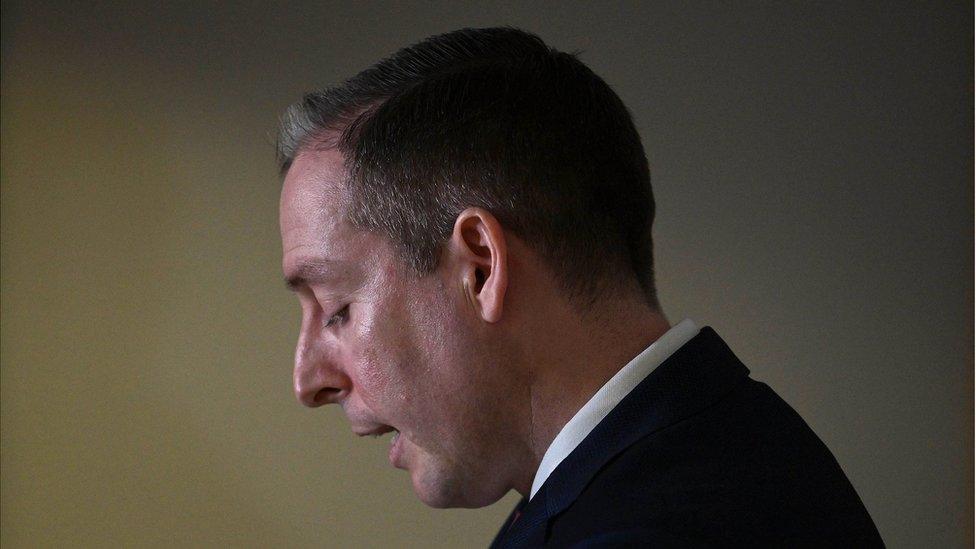Michelle O'Neill: Who is Northern Ireland's new first minister?
- Published
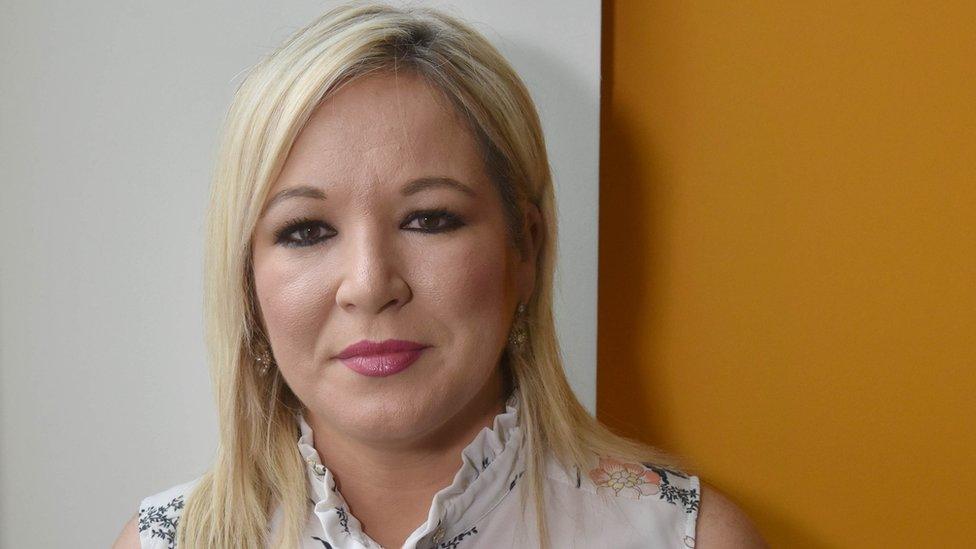
Michelle O'Neill, Sinn Féin's deputy leader, has made history as the first nationalist to hold the role of first minister at the Northern Ireland Assembly.
Sinn Féin became the biggest party at Stormont after the election in May 2022, meaning Ms O'Neill has been entitled to the role since then.
But the Democratic Unionist Party (DUP) had refused to join a power-sharing executive as part of its protest against post-Brexit trading regulations, preventing her from taking up the post.
Now a deal has been reached to enable the Stormont institutions to return. On Saturday Ms O'Neill accepted her party's nomination to the post of first minister.
Who is Michelle O'Neill?
Ms O'Neill grew up steeped in the history of Northern Ireland's Troubles.
Born Michelle Doris on 10 January 1977, she was raised in the rural village of Clonoe in County Tyrone and hails from a family of prominent Irish republicans.
Her father, Brendan Doris, was a former IRA prisoner who became a Sinn Féin councillor in Dungannon in the 1980s.
Her uncle, Paul Doris, has been president of Noraid, a republican fundraising group.
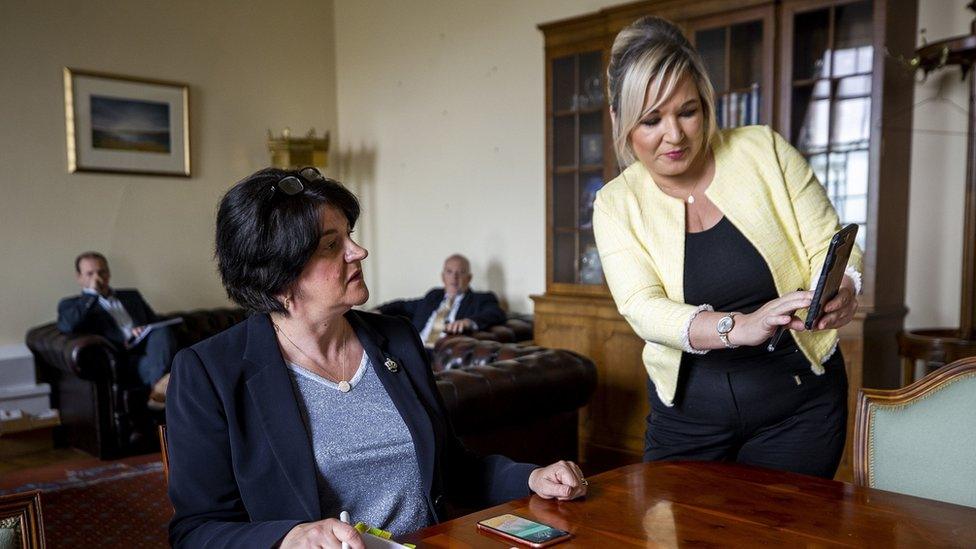
Michelle O'Neill (r) was deputy first minister alongside Arlene Foster from 2020
As a teenager, she was educated at St Patrick's Girls Academy in Dungannon, County Tyrone.
At the age of 16, while still a pupil there, she became pregnant with her first child.
In an interview with the BBC in 2022, she recalled that she had been prayed over at the Catholic grammar school.
However, she said she had "really strong support" from her parents and her partner during this period of her life.
"Mummy actually gave up work so that I could go back to school," Ms O'Neill said in a recent social media video.
"She stayed at home, she did the babysitting and allowed me to go back and finish my education which was obviously very important."
She returned to St Patrick's to sit her A Level exams and after leaving school she began training to become an accounting technician.
How did she get into politics?
When the Good Friday Agreement, the peace deal that helped bring an end to 30 years of violence in Northern Ireland, was signed in 1998 she began working for Sinn Féin.
It brought her into direct contact with the party's deputy leader Martin McGuinness, who at that time was running for election in the Mid Ulster constituency.
In addition to working with him and his fellow Mid Ulster assembly member Francie Molloy, she spent this period training as a welfare rights adviser.
When her father stepped down from Dungannon and South Tyrone Borough Council ahead of the 2005 election she won the seat he vacated in the Torrent electoral area.
She would later become the first woman to hold the post of mayor in the borough.
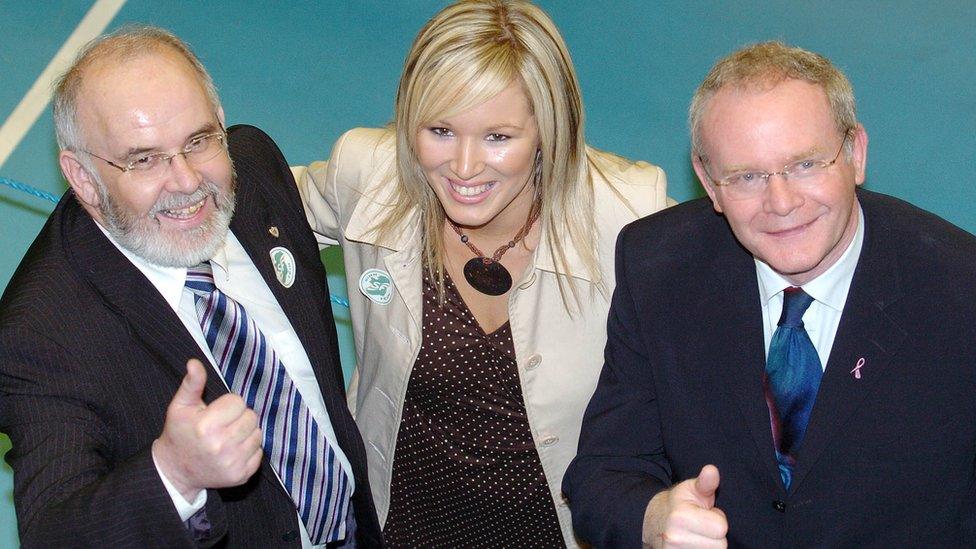
Michelle O'Neill joined Francie Molloy and Martin McGuinness as a Mid Ulster MLA in 2007
Her assembly career began in 2007, when she joined Mr McGuinness and Mr Molloy as a Mid Ulster assembly member.
She became her party's spokeswoman for health and sat on the education committee.
After four years on the backbenches at Stormont, Sinn Féin appointed her as minister for agriculture in 2011.
In 2016 she became health minister, one of Stormont's most high-profile and challenging portfolios.
She was faced with mounting hospital waiting lists, a crisis in general practice and the findings of the Bengoa report into how Northern Ireland's health care is organised.
Her response was a 10-year plan to transform the health service, saying it would improve a system that was at "breaking point".
Opposition politicians questioned the lack of details in the plan, which was not costed.
But it set out a range of priorities, including a new model of care involving a team of professionals based around GP surgeries.
How did Michelle O'Neill become deputy first minister?
On the eve of Ms O'Neill's 40th birthday in January 2017, Martin McGuinness announced his resignation as deputy first minister to protest against the DUP's handling of a botched energy scheme.
At Stormont the positions of first and deputy first minister are joint roles - if one resigns it forces the resignation of the other, collapsing the power-sharing executive.
When Mr McGuinness died soon afterwards, Ms O'Neill was selected to replace him as Sinn Féin deputy leader.
She said it was "the biggest honour and privilege" of her life.
Ms O'Neill had been at the forefront of her party's response to the Renewable Heat Incentive Scandal (RHI) at the time.
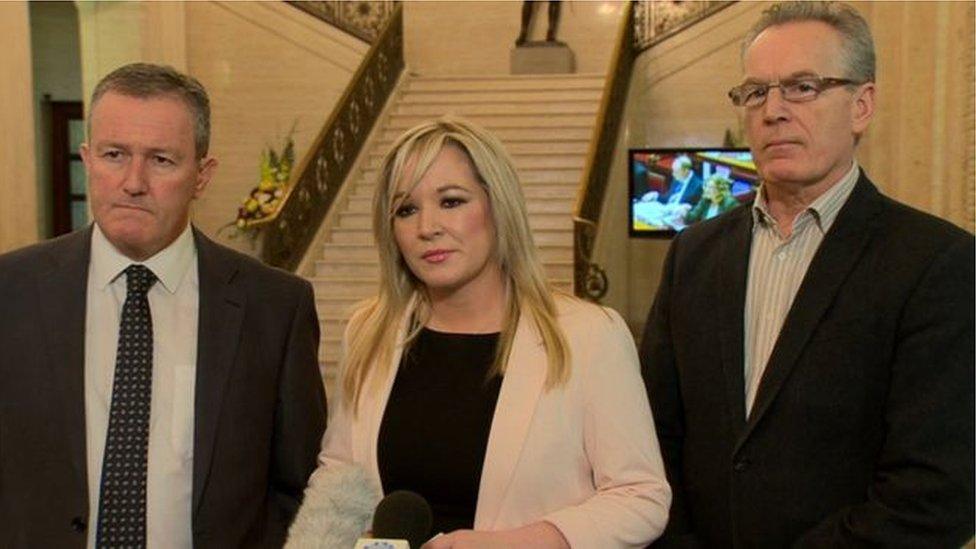
Michelle O'Neill with Sinn Féin colleagues Conor Murphy and Gerry Kelly
She became embroiled in controversy in 2017 when she addressed a rally to mark the 30th anniversary of the killing of eight IRA men by the SAS.
The men were killed as they mounted a gun and bomb attack on Loughgall police station on 8 May 1987.
She defended her attendance at the rally by saying she was an Irish republican and would "always remember and commemorate our patriot dead".
When Stormont returned in January 2020 after three years of deadlock, Ms O'Neill was appointed deputy first minister, just as the Covid pandemic was beginning.
Her attendance at the funeral of republican Bobby Storey in June 2020 sparked a major political row at Stormont, with Sinn Féin being accused of disregarding Covid-19 restrictions on public gatherings.
Police investigated but the Public Prosecution Service decided not to pursue any prosecutions, citing engagement between police and funeral organisers and a lack of clarity in Stormont's coronavirus regulations.
Ms O'Neill defended her attendance, saying she acted within the rules and would "never apologise for attending the funeral of my friend".
She later expressed regret over public health messaging being "undermined".
Her time as deputy first minister ended in February 2022 when Paul Givan tendered his resignation as first minister in February 2022.
Stormont has been in stalemate since then until now.

Neither Michelle O'Neill nor Paul Givan could stay in office if the other quit
Electoral success and meeting the King
In May 2022, Sinn Féin became the largest party at Stormont for the first time, and repeated the achievement in local council elections the following year.
Ms O'Neill said both elections were historic and called for the DUP to end its boycott of Stormont.
She became embroiled in further controversy in August 2022 when she told BBC News NI's Red Lines podcast that there had been "no alternative" to IRA violence.
The brother of a man murdered by the IRA described her remarks as "sickening" while opposition politicians also criticised her.
In May 2023, Ms O'Neill attended the coronation of King Charles, saying it was important to show respect to others.
The republican party has traditionally objected to the monarchy, particularly in relation to its role in Northern Ireland.
Related topics
- Published23 January 2017
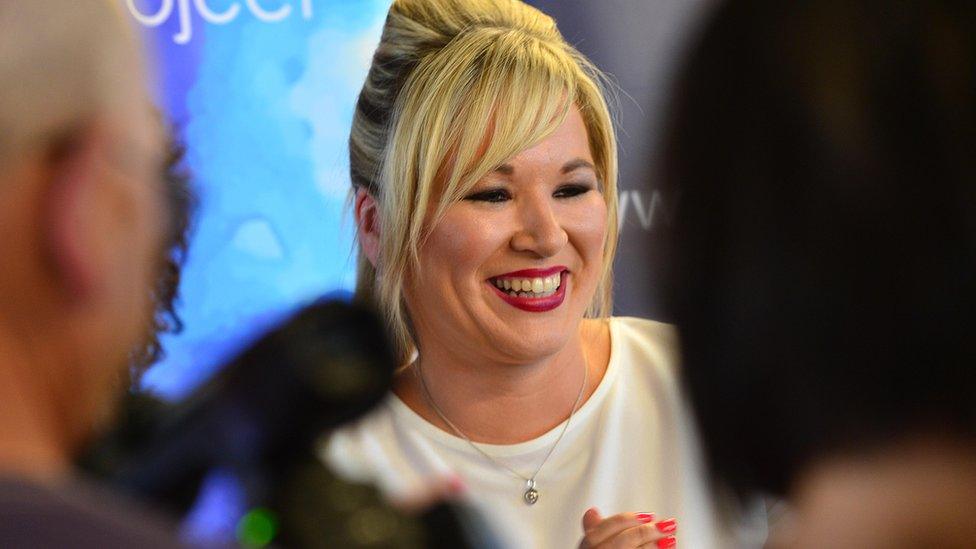
- Published3 February 2022
